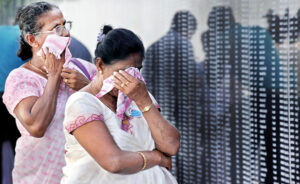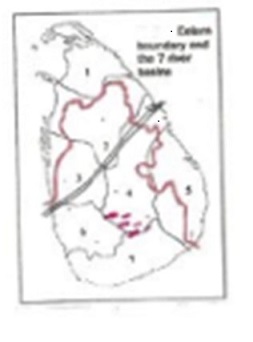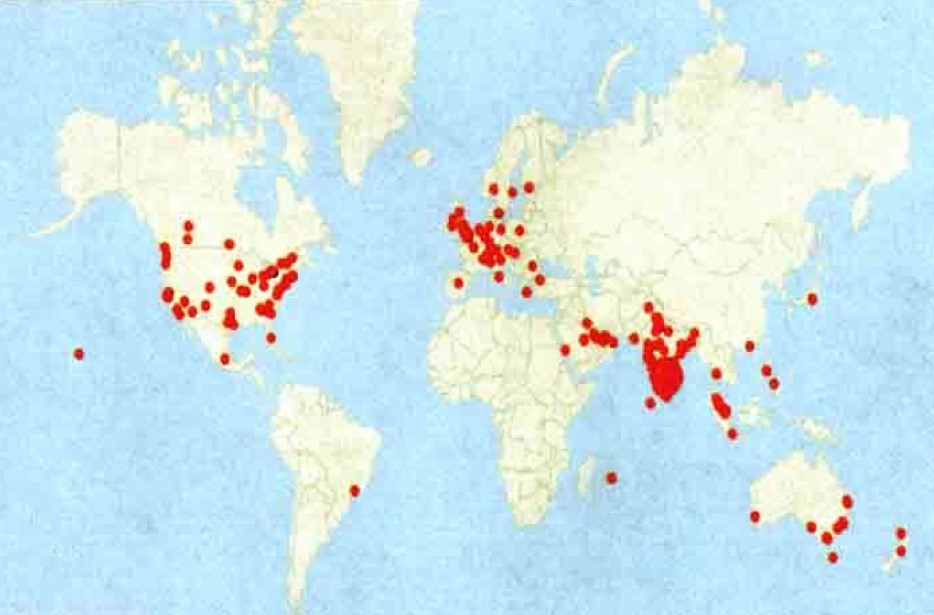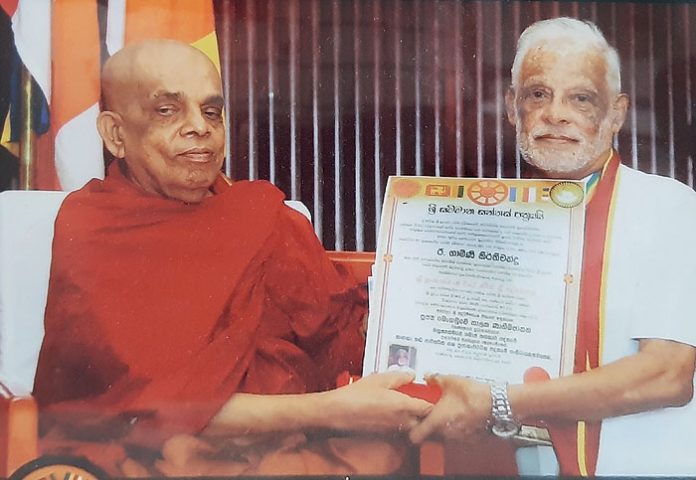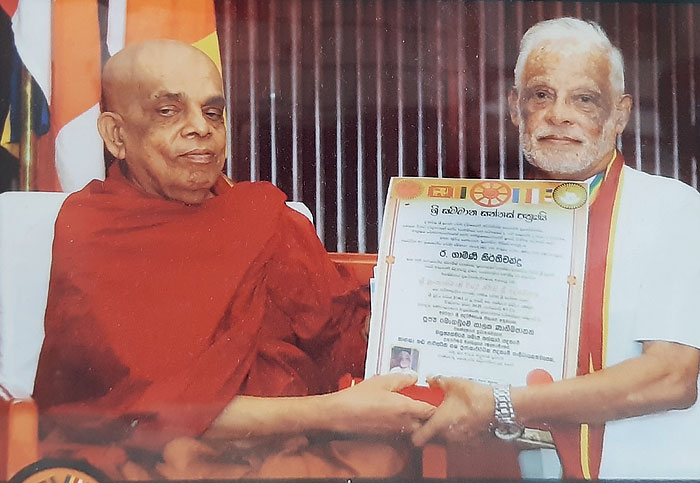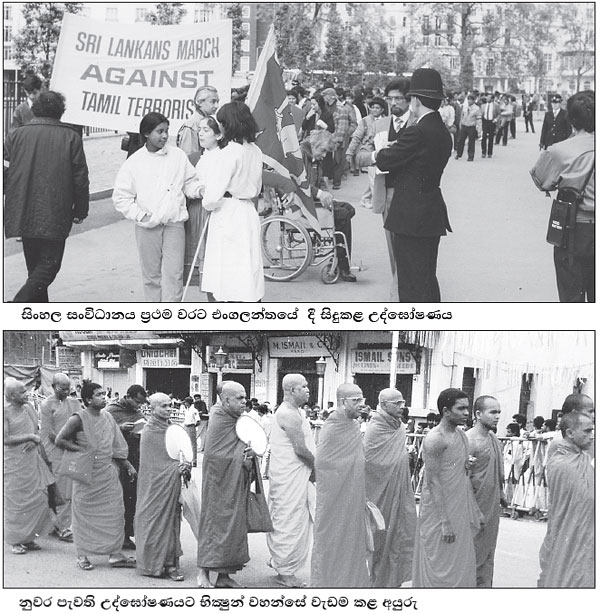English with a Smile! Posted on May 14th, 2014
September 14th, 2022C. Wijeyawickrema, LL.B., Ph.D.
‘English with a smile’- a reply to Dayan Jayatilleke
The short essay by Edward Theophilus (Perera), The decision to educate in the English medium (Lankaweb, Sept 12, 2022), took my mind back to a long essay that I wrote in 2001 titled, Gurulugomi to the Rescue: The re-enthronement of the English Language” (The Island, April 13, 2001). It was reprinted on Lankaweb in May 14, 2014, as C.A. Chandraprema in 2001.”
These days when a system change or change of systems is the life and death topic in the country, a system change to English medium looks like an appropriate subject for discussion. This English fever has already invaded the Law College and for some university programs, and recently a secretary of the education ministry wanted to go English with public school education. A country which has failed miserably in providing a working knowledge in English as a second language, embracing English medium as a panacea for all ills has been a black-white strategy, in their long-term target of making Sinhala nation a <Sri Lankan> nation.
Thus, Tamils will have Tamil And, Muslims will have Saudi Arabia and Rich Christians will have Rome, but the Sinhala race without its language will be forgotten in 100 years.
The adverse and unfortunate effects of removing history and geography plus Sinhala literature from schools are so obvious now. The bearded Aragalaya boys and girls whether they are international school crop or not, behave as if they have no roots linked to our 2,500-year-old civilizational norms. They have become Mother’s Day and Valentine’s Day zombies. Therefore, we need to have a better understanding of this English mania. Fortunately, Lankaweb archives is a treasure-trove of valuable information on Sri Lankan affairs, especially for the Sinhala Buddhists all over the world.
On this question of taking the English raft on one’s shoulders after crossing the river, instead of treating it as a skill gained like learning how to swim or riding a bicycle, I have written several essays in the past, linked below for easy reference. The crux of the matter is English happened to be the language of the colonial master. Not knowing English therefore, created an automatic inferiority complex, a mistake in speaking made one subject of public ridicule. This was not so with errors made in leaning any other language for example a Tamil learning Sinhala or vice versa.
Edward knows at least three languages and his friend my classmate in Sri Lanka, ex-history professor Frank Perera, now teaching English to German executives in Germany knows at least 6 languages to the extent of translating books (novels).
People learn other languages for its commercial/practical value. Thus, Tamils who refused to become proficient in Sinhala, learn the language of the European country that they become political or economic refugees in no time! Very few people learn other languages as a linguistic adventure, for pleasure. In America, parents are now taking their children away from French and German to Chinese, Japanese or Russian for their economic value in business. In Sri Lanka youth learn Korean to get jobs not knowing the hard and harsh working environments awaiting them!
The affair between English and Sinhala/Tamil in Ceylon/ Sri Lanka has had a unique history. This was so for example in Vietnam, where French is the language of rich and influential Vietnamese. When Ceylon became independent in 1948, there were several Ceylons: English speaking versus those fluent only in Sinhala/Tamil. Then there was Colombo black-white ruling class versus poor rural villagers’ country controlled by the language of English. Black-whites faced humiliation from the whites and poor villagers faced double humiliation from whites and black-whites before 1948. There was also a Christian minority-controlled Ceylon and the Buddhist majority with no power.
In 1956 this system of dominance faced a threat, but black-white Sinhala party politicians converted the simmering religious tension into a language clash between Sinhala and Tamil masses. Rich English-speaking Vellala Tamils went to Madras or Colombo universities, but it was only after 1956, poor Tamils who did not know English could go to Colombo universities in Tamil medium. Poor Sinhala medium students from villages captured the undergraduate world.
But a big mistake took place, perhaps by deliberate design by the ruling black-white class. They neglected teaching English as a second language and made the new generations unable to read, write and speak in English. Arjuna Mahendran now hiding in Singapore with a new name, when he was head of the BOI said that Sri Lanka is poor and not developed because of neglecting English proficiency. Some others said that JVP is bad because their leaders are weak in English!
LankaWeb – C.A. Chandraprema in 2001
LankaWeb – ඉංගිරිස් පාරුව කරට ගැනීම
LankaWeb – ඉංගිරිස් පාරුව කරට ගැනීම – II
LankaWeb – ඉංගිරිස් පාරුව කරට ගැනීම – III
LankaWeb – Muslim Ministers and law college
LankaWeb – Cricket is language-blind!
LankaWeb – What is the language of cricket?
LankaWeb – Council of legal education, a black-white citadel, embraces the English panacea! Part-2
LankaWeb – Council of legal education, a black-white fortress, embraces the English panacea
LankaWeb – -ËœEnglish with a smile-â„¢- a reply to Dayan Jayatilleke
=============================
Empowering law students with an English language tool
Courts of law and social engineering
Comments made recently by the Chief Justice of Sri Lanka on the subject of teaching English to law students (Daily Mirror, March 12, 2008), prompted me to read again an essay that I wrote seven years ago titled, “Gurulugomi to the Rescue: The Re-Enthronement of the English Language” (Island, April 13, 2001). It also reminded me what one of my wife’s relatives, a self-made goda perakadoruwa by vocation, told me some time back. He said, “Lawyers and judges now-a-days cannot speak in English,” and my quick reply was, “do you think in Japan, Germany, Russia, Cuba, or Israel lawyers work in English?”
A working knowledge of any language is useful to anybody, anywhere. I often wonder why we do not consider learning English the same way we try to learn how to ride a bicycle. When the time comes, we do not give it up until we get the balance and are able to take that first magic ride to freedom. Learning a language is like learning how to type, how to swim and how to use a computer and the Internet. A language is a window to see the cultural world of that language. Very few people but learn or study a language for the sake of learning. They are driven by an immediate benefit that can be derived by knowing it. For example, in Texas, USA learning Spanish is considered an advantage in getting a job or living in harmony with Mexican immigrants. Tamils migrated to other countries in the world learned the languages of those countries despite the “mental block” they had in attaining a working knowledge in Sinhala.
Working knowledge versus re-enthronement of English
The Roman-Dutch law is the common law in Sri Lanka, but the Anglo-American jurisprudence has been the basis of most of Sri Lankan laws. Therefore, there is no question that a law student in Sri Lanka should be able to read law books available in English to become a more effective lawyer. I can remember when I was a law student, I obtained books from three other countries. The retired law college principal Dr. Joe Silva studied law with me. The “Flat world” is at least for now a “flat English world.” The World Trade Organization (WTO) does its business in English. But in USA the middle-class “soccer-mothers” force their children to learn Russian, Chinese, Japanese, Arabic and Hindi. German and French classes are no longer in demand.
However, an ability to speak English is not a short cut to Nirvana. If so those countries where English is the mother tongue should not have poverty, unemployment or high school kids taking guns to schools! A genuine desire to empower law students can however end up as an unintended legal impact of restricting legal education to a privileged social class. The efficacy of law is a fascinating field of study in this regard. Those who routinely promote English ignore two important concepts— proficiency in a second language and barriers to learning English in public schools. In a former English colony promoting the first concept often becomes a victim of the second. Proficiency in English is prevented by several socio-economic reasons. I know a monk with a first-class degree in Buddhism, who went to Japan and won prices in debates conducted in Japanese. He was weak in English despite doctoral work in Japanese. Learning Sanskrit is ten times harder than learning English or French. But when I asked him about his English “problem” he said he could not learn English in Sri Lanka because others laughed at him whenever he made a mistake. If he tried to learn German and made mistakes nobody in Sri Lanka would have laughed at him. This is because English has been a weapon of class-privilege in Ceylon/Sri Lanka.
Lord Macaulay’s grandchildren
Because access to learning English is not available to common people and poor children, any qualifying requirement of English will prevent them entering law college or universities. This will then take the clock back to pre-1956 era. The solution should be to teach English as a second language effectively at public schools and then teach English as a required subject at higher educational institutions. Otherwise, in general, those who speak or write about this subject in former British colonies unknowingly commit the same sin, a superiority complex, committed by Lord Macaulay in 1835—who could deny that a single shelf of a good European library was worth the whole literature of India and Arabia,” Macaulay: The Shaping of the Historian by John Clive, Random House, 1973, p.372. It could give the appearance that the new masters to whom the white masters transferred the ruling power have volunteered themselves to take the “White Man’s burden” upon their shoulders.
Law College was for the rich and the powerful
In the case of the Law College this is even more relevant because it was a trade school for the rich and the powerful to serve their sons and daughters who could not enter the university or who could not go abroad to study. The change of medium of instruction altered this historical function. Therefore, the words “senseless and foolish” need some sort of judicial re-adjustment. If the judicial branch of a country is limited to a particular elitist class of people, the general complaint against the law is nothing but a weapon in the hands of the ruling elites (social norms favourable and acceptable to the ruling class becomes laws) ends up in double jeopardy attracting extra-judicial remedies by way of rebellion or sabotage (example: JVP 1971, 1988-9).
The value of the mother tongue
Why students should learn in their mother tongues and receive a working knowledge in a foreign language is not just a socio-political issue. The colonial education policy of the British Empire was aimed at killing the mother tongues of the natives, just like the colonial economic policy was designed to drain the resources of the colony to London or Liverpool. In Ceylon, Colombo harbour became the outward mouth of the drain. In India it was Bombay, Calcutta, Karachchi and Madras.
For a detailed history of the colonial education policy, the best source is chapter 12 “Indian Education: The Minute” of Clive’s book on Macaulay. There were two opposing views. “Engrafting” Western knowledge upon Indian cultural traditions by means of Sanskrit and Arabic and “downward filtration,” the creation of an educated elite who would themselves become teachers to other great mass of poor Indian people. The latter policy had an evangelical and utilitarian bias. So, Macaulay said, “we must at present do our best to form a class who may be interpreters between us and the millions whom we govern; a class of persons, Indian in blood and colour, but English in taste, in opinions, in morals, and in intellect.” Who could deny that NM, Leslie, Colvin, Lalith, Gamini, JRJ, Dudley, Sir John, Sir Oliver, Sir Solomon Dias, DS Senanayake, Ranil, Neelan-GL, CBK and so many past native Chief Justices did not qualify as grandchildren of Macaulay?
Since its top priority was making profits, the colonial government left education in the hands of religious and private organizations. As summed up by Nehru, colonial masters supported a policy of “education for clerks.” In 1851, Radha Kanta Dev, a progressive Calcutta merchant warned against a system, whereby, .with a smattering knowledge of English, youths are weaned from the plough, the axe and the loom, to render them ambitious only for the clerkships for which hosts would besiege the government and mercantile offices…” Dev favoured agricultural and industrial schools, where skills could be taught. For him the prerequisite for these was a solid vernacular education. Lord Curzon who divided Bengal into two in 1905, made the same point half a century later (Clive, p. 416).
Gandhi once said, “It was nothing less than scandalous that people should devote the best years of their lives to mastering a foreign tongue.” The Buddha said twenty-five hundred years ago that one’s mother tongue was the most appropriate medium of education. He used Magadhi (Pali), the people’s mother tongue and not Sanskrit (the Brahmin masters’ language). Sir D. B. Jayatilaka, who opposed the introduction of universal suffrage, was convinced that originality of thought was inextricably bound with one’s own mother tongue. He asked, “We have had English education in this country over a century…but has anyone left a single book in English verse or prose which will survive a generation?” (Legislative Council Debates, 1928:368). As cited in Professor K. N. O. Dharmadasa’s book, Language, Religion and Ethnic Assertiveness (1992, p. 215), Ananda Coomaraswamy, who was fluent in ten languages, went even further to endorse strongly the link between one’s creative and intellectual development and his/her mother tongue.
The era of teaching Sinhala in English
A group of dedicated Sri Lankans fought to open the doors of the university to the common people of Sri Lanka. When the plug was removed, big-fat-rich kids from Colombo and other big cities had no chance. In the early days university admission decisions were made after a personal interview. And at the interview, as reported by Felix Dias B, Sir Ivor asked him, “Since your father is a judge of the Supreme Court are you also planning to be a judge of the Supreme Court?” to which FDB replied, “No, I want to be the vice chancellor of the university so that I could select students.” They were just scratching each other’s backs! While Royal, St. Thomas’ and even the St Joseph’s dropped out of the scene, village students with 8 distinctions at G.C.E. (O.L) flooded the university.
What had happened to the Philippine Islands, Africa or to some South American cultures or more recently to South Korea did not happen in Sri Lanka, because of life-sacrificing acts of Walane (Panadura) Siddharta (1811-68), whose wisdom resulted in the establishment of Vidyodaya (1873) and Vidyalankara (1875) Pirivenas, Migettuwatte Gunananda (1823-90), Hikkaduwe Sumangala (1827-1911), and the arrival of Colonel Olcott (the first white Buddhist) and many others. It is true that some children of school principals, postmasters and village landowners had an opportunity to enter the University of Ceylon. But the Kannangara Free Education Reforms did not reach the masses until the people’s revolution in 1956 and the decision to teach in Sinhala and Tamil in the university. In the 1960s, to supplement the university bursary system, Dr. N. M. Perera, added a university students’ bank loan scheme through the People’s Bank. But it was not an easy victory. We all know what Sir Nicholas, the dean of medical faculty told F. R. Jayasooriya when the former was approached to teach medicine in Sinhala, “first go and teach your Sinhala in Sinhala and then come to me.” In this effort FR had the backing of I. D. S. Weerawardena, who pioneered teaching political science in Sinhala, with the support of his English wife, until his untimely death by a misdiagnosis of chickenpox. Tamil professors did not join the swabhasha movement because rich Tamils went to the Madras University for higher education. The language of medicine in Ceylon was class privilege and money. Private medical schools and private universities are not bad ideas per se if we know the real reason behind them. People who get rich by just means taking risks must be allowed to enjoy their wealth. Is this against Buddhism?
Colonialism and English
Our admiration of the West and the English language need not become an obsession. Blind faith in everything Western and American could become a mental sickness. For example, why are people from Colombo embrace things coming from America, which even the Americans in America, are rejecting? A good example is the McDonald hamburgers notorious as an unhealthy fast food (The McDonaldization of Society, George Ritzer, 1993).
A Buddhist Jataka story tells us not to take the raft on to our shoulders after we used it to cross the river. English is only a raft, and it need not be a Kaduwa. English is a very economical language. Because it is so widespread proficiency in English is a passport to see the world. It has a rich vocabulary, flexible and has relatively simple spelling and pronunciation. If a standard western typewriter keyboard were to expand to take in every Chinese ideograph it would have to be about 15 feet long and 5 feet wide (The Mother Tongue: English and How It Got That Way, Bill Bryson, 1990, p. 118). There is no reason to love English, and there is no reason to hate it. Politicians and their henchmen-officers are playing the same old game when they say that Sri Lanka is in a mess because English was ignored. It is better if the judiciary does not get involved in such issues.
Barriers to English Proficiency
All what a Sri Lankan child needs is one class period of quality English every school day from grades 2-10. As Dr. S. Kariyawasam reported (Island, May 4, 2000), of the 40,000 English teachers, nearly 19,000 recruited in 1972, came with a credit pass in English at the G.C.E. (O.L.). Three decades later are we doing a better job in solving this problem of quantity and quality of English language teachers? How many schools even within a 25- mile radius from Colombo could claim that they have enough qualified English teachers? Teaching English as a foreign language is not the same as speaking English. The failure of the Education Department in this regard has helped tuition masters to make money without paying taxes.
Sri Lanka had a reasonably good textbook translation service in the 1960s and who killed it? There is no single path to make children proficient in English. It can be done without killing their mother tongue. Those days there were night schools attached to temples where English was taught free. Who killed that concept? Why cannot this method be revived? This is a low cost, village level approach suitable for those who are genuinely concerned with helping the masses. We commemorate with gratitude what the American Olcott did for us in the 1880s. He helped to establish schools for the Buddhists at a time the government was not willing to help. Ironically, those who had the responsibility of continuing Olcott’s mission neglected teaching English to Buddhist monks attending the pirivenas. It is much harder to learn Sanskrit but student-priests learned Sanskrit and Pali and not English. Buddhist priests had to rely on the English knowledge of the lay Buddhist leaders. Same thing happened with the Marxists. The leaders spoke English but the ordinary members, the labourers and clerks did not know it.
Providing a working knowledge of English to those who study in their mother tongue should not be a matter of Anto-Jata-Bahi-Jata.
Source: The Island, 2008/03/19
ME P1I (19-03) ….qxd (island.lk)
http://pdfs.island.lk/2008/03/19/m2.pdf

